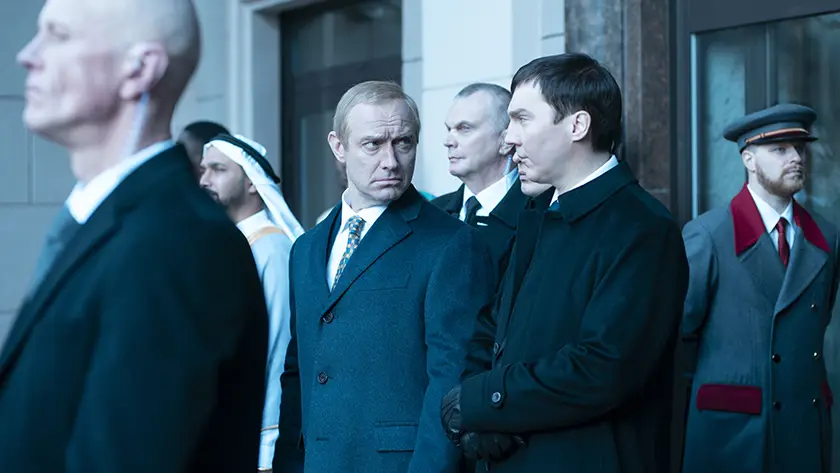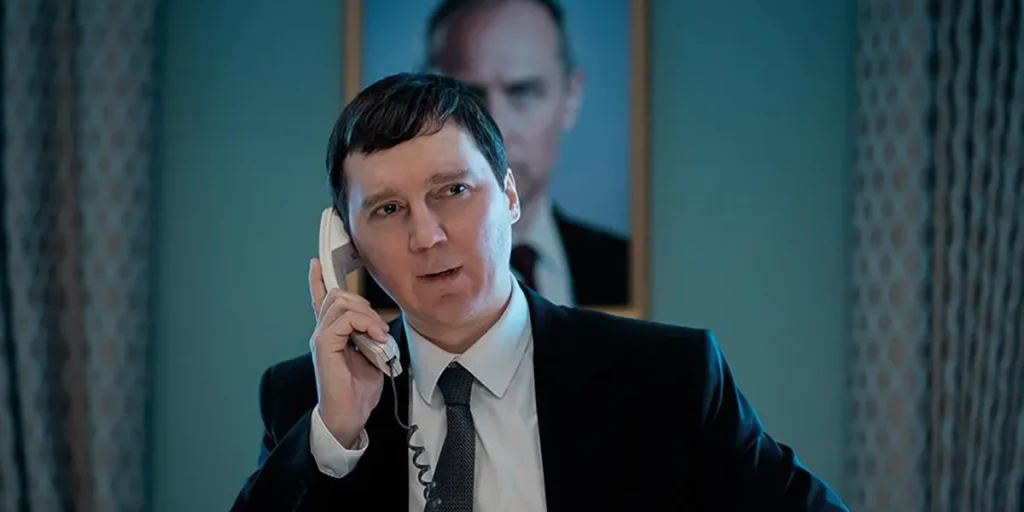The Wizard of the Kremlin is an unfortunately dull, objective walk through the politics of post-Soviet Russia, without a clear opinion to ground its story in.
Director: Olivier Assayas
Genre: Political Drama, Historical, Thriller
Run Time: 120′
Venice World Premiere: August 31, 2025
U.S. Release Date: TBA
U.K. Release Date: TBA
There are very few figures whose lives in recent years have been more controversial and protested than Vladimir Putin’s, the Prime Minister of Russia throughout most of the 21st Century. But despite the film’s provocative marketing, The Wizard of the Kremlin is actually a very sterile and predictable film. There’s none of the sharp commentary or political awareness that one would expect from a film about Putin’s rise to power, but rather a frustratingly docile description told from an outside perspective.
The Wizard of the Kremlin follows Vladimir Putin’s (Jude Law) fictional underling, Vadim Baranov (Paul Dano) – an ambitious young talent who gradually climbs the ranks of his career through amateur dramatics, to television production, and ultimately inside the walls of the Kremlin. The story is told through a series of flashbacks and anecdotes, as an older Baranov recounts his accomplishments and regrets to an American journalist (Jeffrey Wright).
In many ways, The Wizard of the Kremlin is clearly an “anti-Putin” movie. There’s an obvious condemnation of his policies, from the enforcement of his authoritarian police state in the early 2000s to the more recent invasion of Ukraine, but it often feels like director Olivier Assayas is more interested in the “what” than the “why”. The film is very plot-heavy, jumping across timelines to depict Baranov’s involvement in certain real-life events, but it doesn’t seem to have any answers to the vague questions that it raises.
Dano’s narration backgrounds the entire film, providing the audience with all the necessary political context for each chapter of The Wizard of the Kremlin. He talks us through the collapse of the Soviet Union, the country’s longing for Putin’s strong, Stalin-esque rhetoric, and the perception of modern Russia on the world stage – but he rarely focuses on the characters themselves, which should be the core of this story.

The Wizard of the Kremlin’s dense writing and historical focus allow it to succeed at being educational – so much so, in fact, that audiences will easily forget Baranov wasn’t a real person at times. But as impressive as this is, the lack of character development and thematic depth will leave many questioning what the point of the film was. Why create this fictional character at all if the film isn’t going to use him to interrogate the real figures around him? The concept begs for a kind of “alternative history” approach, but Assayas is determined to make his story as accurate and objective as possible.
The film also struggles with major pacing issues, as its episodic approach to storytelling feels more like reading subsequent sections of a Wikipedia article than moving naturally through somebody’s life. By the seventh or eighth time that an obtrusive subtitle fills the screen and informs the audience which seemingly random political event we’re going to explore now, it feels like Assayas is really getting in his own way of letting this story play out naturally. Perhaps this structure would have worked better as a limited series or a sequence of short films, allowing each one to follow a specific event without it feeling like the film was simply rushing to get through all the key points.
There’s still a lot to enjoy with The Wizard of the Kremlin, even if the final product lacks the bite necessary for a film about such dense topics. Paul Dano’s lead performance is very compelling, and he perfectly captures the careless apathy that allows these dangerous politics to become so widespread in the modern era. Jude Law makes for a chilling Vladimir Putin, though his interpretation certainly doesn’t strive to be the most accurate or lifelike.
Ultimately, The Wizard of the Kremlin’s biggest sin is missed potential. There’s nothing egregiously bad about the film – in fact, the direction and performances are exceptionally strong at times – but there’s so much more that Assayas could have done with this concept. Portraying the vicious, manipulative politics of the Kremlin without truly interrogating the characters and bringing a clear, new opinion to the table is at best frustrating and, at worst, irresponsible.
The Wizard of the Kremlin (Le Mage du Kremlin): Movie Plot & Recap
Synopsis:
Amid post-Soviet chaos, a brilliant young man, Vadim Baranov, charts his path. First an artist, then a reality tv producer, he becomes the spin doctor to a rising KGB agent: Vladimir Putin. At the heart of power, Baranov shapes the new Russia, blurring the boundaries between truth and lies, belief and manipulation.
Pros:
- Strong, subversive performances from both Paul Dano and Jude Law
- Fast-paced storytelling that makes the long runtime more bearable.
Cons:
- An unwillingness to critically comment on the political ideas it discusses.
- Shallow characters without a true path of development.
- An ineffective structure that stretches the story far too long.
The Wizard of the Kremlin (Le Mage du Kremlin) had its World Premiere at the Venice Film Festival on August 31, 2025.

